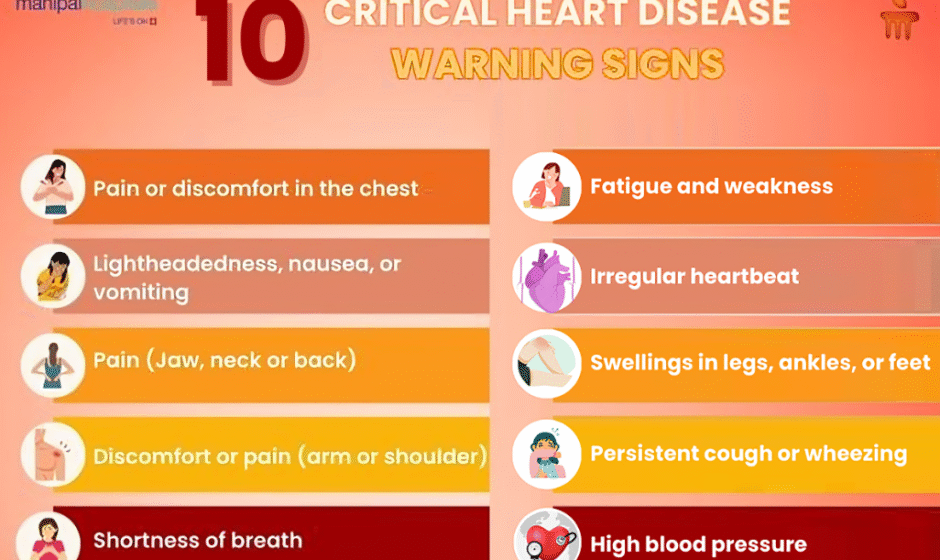Heart disease remains a leading threat to health worldwide. While often perceived as a sudden event like a heart attack, it frequently develops insidiously, whispering warnings long before a crisis strikes. Recognizing these subtle, early signs is not just important – it can be life-saving. Early detection dramatically increases the chances of effective treatment and helps prevent devastating complications like heart attacks, stroke, or severe heart failure. Don’t ignore these crucial signals your body may be sending:
- Chest Pain or Discomfort (Angina): This is the most common early sentinel. It’s rarely a sharp stab; instead, it often feels like pressure, tightness, heaviness, squeezing, or a dull ache in the chest. Crucially, this discomfort may radiate to the neck, jaw, shoulders, back, stomach, or arms (especially the left arm). Easily mistaken for heartburn or indigestion, angina typically appears during physical exertion or emotional stress and usually subsides with rest. Don’t dismiss recurring chest sensations.
- Shortness of Breath (Dyspnea): Finding yourself unusually winded doing activities you previously handled easily? Difficulty breathing with minimal exertion, or experiencing unexplained shortness of breath even at rest, is a significant red flag. This can indicate your heart isn’t pumping efficiently, potentially signaling heart failure or other serious cardiac issues. Pay attention if climbing stairs or walking short distances suddenly leaves you gasping.
- Palpitations: Feeling your heart racing, pounding, fluttering, skipping beats, or beating irregularly can be unsettling. While often caused by stress, caffeine, or benign factors, persistent or unusual palpitations warrant investigation. They can signal an underlying arrhythmia (abnormal heart rhythm) that needs medical attention.
- Unexplained Fatigue or Weakness: Feeling profoundly tired, drained, or experiencing a significant drop in energy levels – especially if it’s new, severe, or unexplained – is a vital warning sign. This is particularly common in women, older adults, and people with diabetes. If routine activities suddenly feel overwhelming, consider it a potential signal from your heart.
- Swelling (Edema): Noticeable swelling in your legs, ankles, feet, or abdomen is not normal. This fluid buildup (edema) often occurs because the heart isn’t pumping effectively, causing blood to back up and fluid to leak into tissues. Persistent swelling deserves a medical check-up.
- Dizziness or Lightheadedness: Feeling faint, dizzy, woozy, or actually fainting can be linked to a temporary drop in blood pressure or reduced blood flow from the heart. It indicates your brain isn’t receiving enough oxygen-rich blood.
Important Additional Symptoms & Nuances:
- Atypical Presentations: Be aware that heart disease doesn’t always announce itself with classic chest pain. Women, older adults, and individuals with diabetes are more likely to experience “atypical” symptoms such as pronounced shortness of breath, overwhelming fatigue, nausea, or generalized weakness instead of, or alongside, chest discomfort.
- Other Potential Signs: Watch for:
- Nausea or vomiting, especially when accompanied by other symptoms.
- Excessive or cold sweats unrelated to heat or exercise.
- Pain radiating to the arm (especially left), jaw, or back.
- Skin changes, like a bluish or purplish tint (cyanosis indicating low oxygen) or persistent swelling in the lower extremities.
The Critical Takeaway: Act Promptly
The subtlety of these early signs makes them easy to dismiss as aging, stress, or minor ailments. However, ignoring them is dangerous. If you experience any of these symptoms, especially chest pain (even if mild or intermittent) or sudden, severe shortness of breath, seek immediate medical attention. Do not delay. Call emergency services or go to the nearest emergency room.
Your heart speaks through these signs. Learning to recognize its early whispers empowers you to seek help in time, potentially saving your life or preventing irreversible damage. Listen to your body – it might be sending the most important message you’ll ever hear. Early recognition and prompt action are the cornerstones of protecting your heart health.



